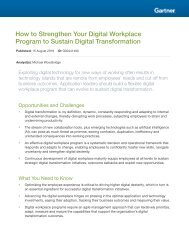The_Future_of_Employment
You also want an ePaper? Increase the reach of your titles
YUMPU automatically turns print PDFs into web optimized ePapers that Google loves.
Average median wage (USD)<br />
80k<br />
60k<br />
40k<br />
20k<br />
0 0.5 1<br />
Probability <strong>of</strong> Computerisation<br />
Bachelor’s degree or better<br />
60%<br />
40%<br />
20%<br />
0%<br />
0 0.5 1<br />
Probability <strong>of</strong> Computerisation<br />
average<br />
weighted by<br />
employment<br />
unweighted<br />
FIGURE IV. Wage and education level as a function <strong>of</strong> the probability <strong>of</strong> computerisation;<br />
note that both plots share a legend.<br />
knowledge <strong>of</strong> human heuristics, implying that a wide range <strong>of</strong> tasks, involving<br />
social intelligence, are unlikely to become subject to computerisation in the<br />
near future.<br />
<strong>The</strong> low susceptibility <strong>of</strong> engineering and science occupations to computerisation,<br />
on the other hand, is largely due to the high degree <strong>of</strong> creative intelligence<br />
they require. <strong>The</strong> O∗NET tasks <strong>of</strong> mathematicians, for example, involve<br />
“developing new principles and new relationships between existing mathematical<br />
principles to advance mathematical science” and “conducting research to<br />
extend mathematical knowledge in traditional areas, such as algebra, geometry,<br />
probability, and logic.” Hence, while it is evident that computers are entering<br />
the domains <strong>of</strong> science and engineering, our predictions implicitly suggest<br />
strong complementarities between computers and labour in creative science and<br />
engineering occupations; although it is possible that computers will fully substitute<br />
for workers in these occupations over the long-run. We note that the<br />
predictions <strong>of</strong> our model are strikingly in line with the technological trends we<br />
observe in the automation <strong>of</strong> knowledge work, even within occupational categories.<br />
For example, we find that paralegals and legal assistants – for which<br />
computers already substitute – in the high risk category. At the same time,<br />
lawyers, which rely on labour input from legal assistants, are in the low risk<br />
category. Thus, for the work <strong>of</strong> lawyers to be fully automated, engineering bottlenecks<br />
to creative and social intelligence will need to be overcome, implying<br />
that the computerisation <strong>of</strong> legal research will complement the work <strong>of</strong> lawyers<br />
in the medium term.<br />
To complete the picture <strong>of</strong> what recent technological progress is likely to<br />
41





